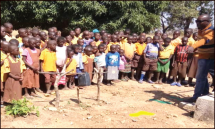Country Focus: Ghana
Private Sector Malaria Prevention
PSMP is a three-year project funded by the United Kingdom Department for International Development (DFID) and operated by the Johns Hopkins Center for Communication Programs (CCP). The purpose of the PSMP is to catalyze private sector engagement in malaria control, in particular in the supply and distribution of Long Lasting Insecticidal Nets (LLIN).
Communicate for Health Ghana (C4H), 2014-2019
The C4H project worked with the Government of Ghana, the Ghana Health Service/Health Promotion Department (GHS/HPD) and local Ghanaian and international development partners to influence behavior change in family planning; nutrition; maternal, newborn and child health; malaria prevention and treatment; water, sanitation and hygiene (WASH); and HIV/AIDS. The project built on USAID’s legacy of improving health and nutrition in Ghana, including support for improved health communication. Partners were FHI360, VOTO Mobile (now Viamo), Creative Storm Networks and Ghana Community Radio Network.
Project objectives were to:
- Support the Government of Ghana’s efforts to influence positive behavior change in the health areas described above
- Strengthen the capacity of the GHS/HPD to effectively develop, coordinate and deliver evidence-based social and behavior change campaigns, including monitoring and evaluation
- Develop and strengthen the capacity of local SBC organizations to deliver quality health communication programming
Voices for a Malaria-Free Future, 2010-2013
Voices for a Malaria-Free Future (Voices) was led by CCP since 2006 and is closely aligned with the United Against Malaria (UAM) campaign, which used soccer as the catalyst to raise global awareness and galvanize worldwide commitment to end malaria deaths by 2015.
Ghana Behavior Change Support Project
The Ghana Behavior Change Support (BCS) Project, 2009-2013, was a 4 year United States Agency for International Development (USAID) supported project managed by CCP with CARE and PLAN International in partnership with the Ministry of Health and the Ghana Health Service (GHS).
The overall purpose of the project was to assist the GHS at the national, regional and district levels to support its efforts to achieve health related millennium development goals through sustained and coherent social and behavior change communication (SBC) interventions. BCS aimed to increase demand and use of commodities and services and create positive behaviors in the areas of: Maternal Neonatal & Child Health Family Planning Malaria Prevention & Treatment Nutrition Water, Sanitation, & Hygiene. Projects include The GoodLife, Live it Well Campaign, 2010-2014 and the Aha ye de Campaign.
Why is This Man Smiling? Vasectomy Promotion Campaign, 2003
In 2003, the Ghana Health Service, the U.S. Agency for International Development (USAID) Mission in Ghana, and EngenderHealth (under its former cooperative agreement) collaborated on a pilot program in Accra and Kumasi metropolitan areas to explore whether vasectomy is a viable contraceptive choice when site interventions that focus on issues of quality and access are coupled with effective and strategic interventions aimed at public awareness. The aim was to make this method available and put the choice into the hands of Ghanaian couples.
Source: Johns Hopkins Center for Communication Programs
Date of Publication: October 7, 2020
SIMILIAR RESOURCES
Tools
Examples
- The Behavior Change Framework
- Using Data to Design an Evidence-based Social and Behavior Change Program in Rural Nepal
- MULTI-SBC: The Programmatic Aid for Multi-Sectoral Integration of SBC for FP Practitioners
- Advocating for Social Marketing Programs to Local Stakeholders
- Moving the Needle on Health Behaviors
- La Planification Familiale dans les Situations d'Urgence: Essentielle,, Voulue, Necessaire et Realisable
- Barrier Analysis Questionnaires
- Integrated SBCC Programs: Key Challenges and Promising Strategies - Webinar
- Guide de Formation Conseil Dépistage du VIH au niveau Communautaire: manuel à l'intention du personnel non médical
- Accelerator Behaviors

